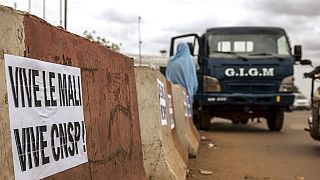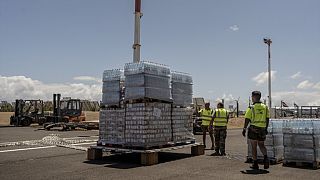Mali
In Mali, as elsewhere in West Africa, there is no respite from the searing heatwave which has descended on the region.
Souleymane Samake is a presenter at Benbakan community radio station on the outskirts of the capital, Bamako.
He says most of its listeners are farmers and many of his broadcasts are currently focused on the weather.
“The provisional weather forecast predicts 41 degrees during the day. So, this interval will last for a week. Let's be careful don't go out, we must protect ourselves against this heat,” he tells listeners.
During a break between broadcasts, Samake says the heat is abnormally high, which is why “it is important for us to provide precise information”.
While it is the hot season, this year, temperatures in Mali, as elsewhere in the Sahel, are reaching record levels.
On top of hotter temperatures, the country is also suffering under an unprecedented electricity crisis that began last year, leaving citizens with no respite from the heat.
It is also having an impact on the country’s ubiquitous ice sellers, often patronised by those looking to cool drinks during the hot season.
With lots of areas receiving less than six hours of electricity per day, many of them have gone out of business.
Djeneba Dembele has been able to continue selling ice due to a combination of solar power and a generator.
One of her clients, Dramane Traore, stopped by to buy two bags of ice.
“We are at 32 or 35 degrees. By 2pm, it will be 40 degrees. It’s unbearable, it’s so hot right now,” he says.
Experts say the deadly heatwave, the worst in living memory, is linked to climate change.
It’s impact, particularly on older people, is significant, with many cases of dehydration and heatstroke.
In Sanakoroba’s public health clinic, Dr Kane Tounkara says the heat is taking its toll on sick people.
Bamako's Gabriel-Touré Hospital reported 102 deaths in the first four days of the month, compared to 130 deaths in all of April last year.
It’s unknown how many of the fatalities were due to the extreme weather as such data is not made public.











01:14
France rushes aid to Mayotte after Cyclone Chido devastation
00:51
UN chief praises Lesotho for its investments in green energy
01:51
UN says Central Africa challenged by climate crisis and political transitions
01:16
António Guterres' vision for climate justice in Africa's G20 leadership
01:43
Over 75% of earth's land is permanently drying: UN report
01:40
Zimbabwe farmers turn to maggot-breeding to survive the drought